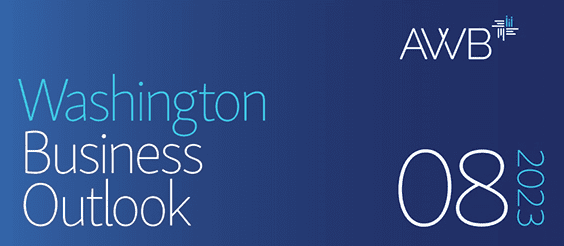New edition of Washington Business Outlook highlights economic trendsNew report: AWB’s Council of Economic Advisors is out today with a fresh edition of Washington Business Outlook, a quarterly report of economic insights for employers. The council is comprised of economists and experts across many industries.
Economic outlook: Inflation is starting to come down and the job market remains strong, and the feared recession has yet to begin, writes Arun Raha, the state’s former chief economist and executive director of the Washington State Economic and Revenue Forecast Council. At the same time, the Federal Reserve continues to raise interest rates, but appears to be at the end of its tightening cycle. - “The overall economic picture is mixed,” Raha notes. “Risks remain elevated. The war in Ukraine drags on, global food grain supplies are threatened, and overseas growth is modest at best.”
Financial picture: John Mitchell, a principal at M&H Economics Consultants and former chief economist for the U.S. Bancorp Western Region, highlighted key financial trends: - Early spring worries about the U.S. banking system, after the collapse of Silicon Valley Bank and First Republic, have subsided.
- The U.S. labor market remains tight with a July unemployment rate of 3.5%. There are 1.67 jobs per unemployed worker, well above pre-pandemic levels.
- Fitch, a national ratings agency, downgraded the U.S. credit rating from AAA to AA earlier this month, in response to the country’s debt ceiling crisis a few months ago.
Energy and agriculture: U.S. energy prices continue to fall, aiding in the decline of overall inflation, notes Grant Forsyth, chief economist at Avista Corp. in Spokane. For businesses, energy inputs fell 22% in July from a year ago, according to one metric. In the agriculture outlook, Desmond O’Rourke writes that prices are higher for five major commodities this season and lower for five. - “Looking ahead, the surge in the cost of major inputs appears to have abated but the average costs of (agricultural) production have continued to rise across the board,” O’Rourke wrote.
|

